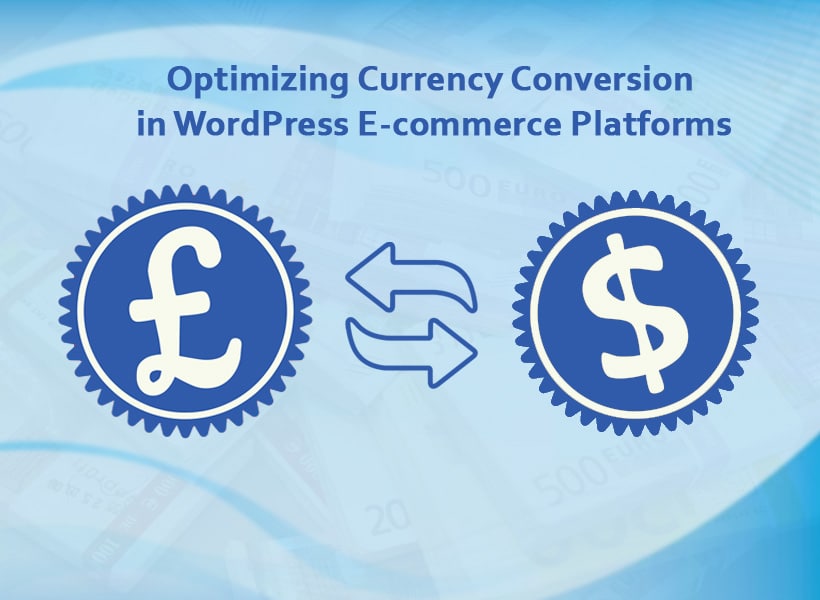
Many websites powered by WordPress software have been designed with retail purposes in mind. While this site builder represents a powerful e-commerce tool, issues can still occur when tackling the ever-fluid nature of currency conversions. How can the process be streamlined and what benefits will a third-party API offer?
Currency Exchange at a Glance: A Global Marketplace
One of the primary goals of any retail-oriented website is to reach as large of a target demographic as possible. This often involves catering to clients who happen to be located in different regions of the world. While such capabilities are certainly enviable, a problem can sometimes arise regarding currency exchange rates. An example will help to cement this point.
Imagine for a moment that your import/export business is headquartered in Spain and you have recently expanded into the UK marketplace. In this scenario, it is crucial to appreciate the relationship between the British pound and the euro. Here are two examples of why keeping abreast of the latest FX rates is critical:
- In the event that the value of the euro falls in relation to the pound, it can be more costly to import products originating from the United Kingdom.
- Should the euro rise when compared to the pound, your products and/or services will become more expensive to UK-based clients.
Note that this is a relatively simple scenario. Exchange rates will become even more important for businesses that might be operating throughout multiple marketplaces (such as the United States, Africa and Asia).
Challenging Scenarios Require Smart Solutions
To be clear, it is always possible to access browser-based currency exchange calculators. A host of well-established websites likewise post real-time updates. These are still not the most practical solutions. This is also when the power and intuitive nature of a cutting-edge currency exchange API comes into play. Let us now examine both sides of the equation.
As a website owner, you need to rest assured in the knowledge that you are providing clients with the most accurate exchange rates at any given time. Not only does this offer an additional level of brand transparency, but you can avoid possible problems such as accounting issues and transactions that happen to be cancelled at the last minute.
It is just as prudent to view things from the point of view of the average customer. Clients who are about to confirm a purchase only to realize that a point-of-sale (POS) platform employs outdated exchange rates are nearly certain to walk away; perhaps to one of your closest competitors.
We can now appreciate the “nuts and bolts” of an API devoted to offering real-time currency exchange information. However, the most advanced WordPress plugins provide a kaleidoscope of additional advantages and these are also worth a closer look to appreciate the big picture.
Scalable Solutions
It is currently estimated that more than 835 million websites are powered by WordPress software. This roughly represents 43 per cent of the total number of active online portals in the world.
There are several reasons why WordPress has become such a popular solution since its inception in 2003. Industry experts will cite traits such as flexibility, relatively easy coding, cost, and a mobile-responsive design. However, another key takeaway point here is associated with the sheer variety of WordPress plugins which are available. A sizeable portion of these are associated with currency conversions. However, a trade-off also needs to be mentioned.
Many current plugins offer only basic levels of functionality. This can be problematic for businesses that require more scalable and customizable solutions. A growing number of owners are therefore choosing to look outside of the proverbial box and download more intuitive options. We are referring to optimization in this sense and some key features may include:
- Current and historical spreadsheets
- Advanced analytics
- Pre-built integrations (ideal for the DevOps community and developers in general)
- Support for languages such as PHP, Java and JavaScript
- The latest FX (foreign exchange) rates
Ultra-fast response times, professional levels of customer support and powerful security protocols are yet even more additional benefits that e-commerce websites can leverage.
All About Client Engagement
Optimization is indeed the “name of the game” when discussing any WordPress site intended to function within the e-commerce community. This is not only important from a functionality perspective. It is just as practical to remember that visitors who interact with a website expect a smooth and streamlined experience; especially when referring to financial concerns such as converting one currency into another or confirming a sale.
Even the smallest of problems can quickly torpedo what might have otherwise been a successful interaction. In the world of FX, one common example could involve an inaccurate exchange rate that causes the client to pay slightly more than the stated retail price. This is another reason why any currency exchange plugin must provide a user-friendly edge so that the pipeline process does not suddenly grind to a frustrating halt.
The Ever-Present Concept of SEO
Many helpful SEO checklists will include suggestions such as keyword and URL optimization, the proper HTML coding and reliable hosting services. However, the rank of a website can also be affected by negative visitor experiences. This may once again lead to lower SERP (search engine results page) rankings and less exposure. The use of cutting-edge APIs (including currency converters) can help to avoid such a situation. This is the very same reason why WordPress plugins in general have become much more advanced and user-friendly over the past few years.
You Get What You Pay For
While there are many WordPress APIs which can act as currency converters, some have been engineered more effectively than others. The best way to retain a competitive edge is to leverage the power of optimized solutions. After all, it pays to work smart as opposed to hard.